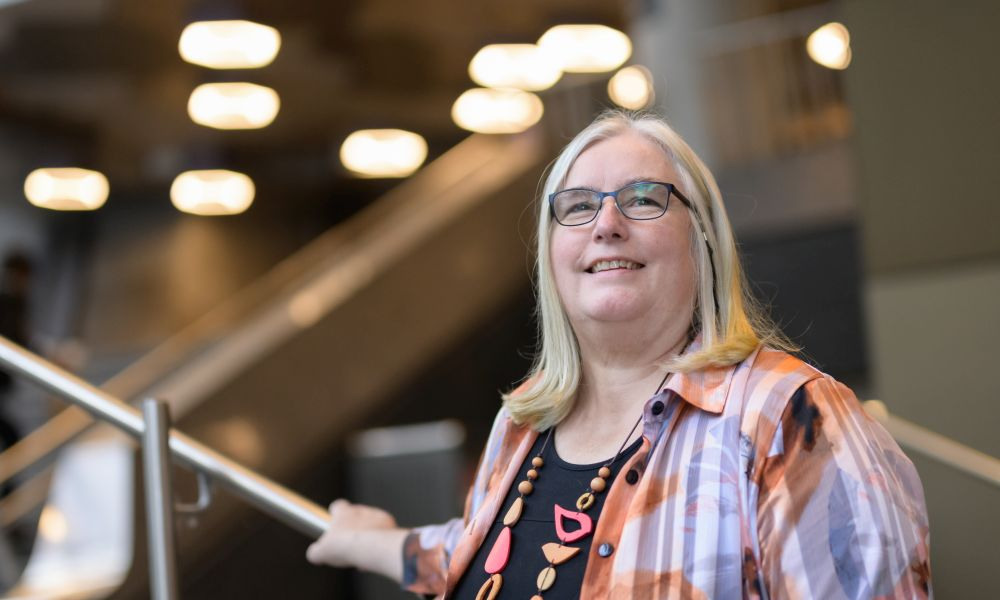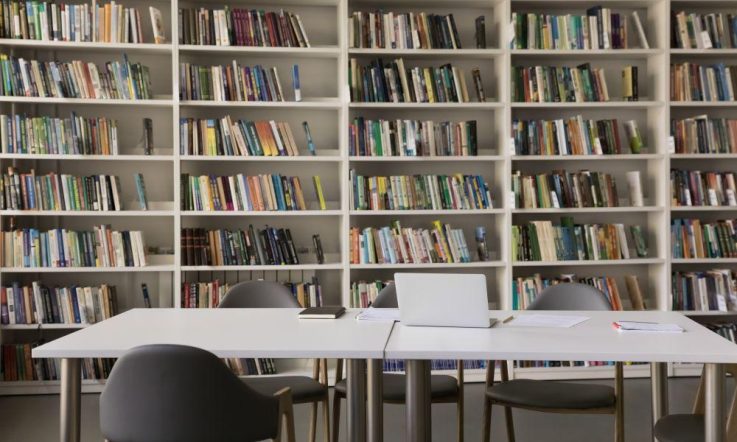The Australian Council for Educational Research’s (ACER’s) Pru Mitchell was recently announced as the inaugural Victorian Library and Information Award (VLIA) winner.
The award – from the Australian Library and Information Association (ALIA) Victoria Group – recognises individuals for ‘exceptional achievements, innovation and commitment’. Mitchell is the Manager of Information Services in ACER’s Cunningham Library, a role which includes the curation and dissemination of evidence-based resources that researchers, teachers and leaders can trust to inform better decision-making.
She also volunteers with Wikimedia (helping to improve the gender imbalance in Wikipedia) and sits on the Advisory Board for Teacher Librarianship at Charles Sturt University. Teacher editor Jo Earp sat down with her to talk about teaching and teacher librarianship, sharing knowledge and expertise, and the role of AI, technology and digital literacy in the classroom.
Congratulations on the VLIA award! Celebrating your achievement, ACER CEO Lisa Rodgers said: ‘ACER’s purpose is to improve learning for all, and Pru embodies this through her leadership, generosity and tireless commitment to connecting people with the knowledge they need to make a difference.’
I am really honoured and gratified to be recognised by colleagues in this way – for doing what I love doing. I couldn’t do it without the support of others. The award criteria were ‘a significant contribution to the advancement of the library and information sector through research, mentorship, publishing, advocacy, collaboration and community engagement and outreach’. It’s recognising my ability to lead and develop library services, but it really is the things beyond the job description – a recognition of that wider impact – that means the most to me.
We’ve been working together at ACER for 11 years, but you started out as a teacher. Where did your love of teaching and librarianship come from?
Yes, I started as an early childhood teacher – following in the footsteps of an aunt and godmother who were both kindergarten teachers in South Australia. I had my first experience of a teacher librarian when I was in year 4 at Berri Primary School. Ms Judge was one of the early graduates once the Commonwealth Government started funding school libraries. She remains an inspiration – she's now an academic with a PhD on reading comprehension.
One of the themes in your work and publications has been education technology; that’s certainly been a fast-moving area in schools!
Yes, there have been a lot of changes – I guess there's a bit of a blessing at this stage of my career to have the benefit of a good dose of hindsight on this. When I graduated, I had to have a 16mm projector licence. So, I can trace a lot of technologies and media that have come and gone through my career.
I can unfortunately also remember quite a lot of wasted money, wasted time for teachers and ineffective use for students. I've been careful more recently to not be such an evangelist and more of an advocate for giving teachers permission to watch for a while and read evidence from the early adopters. Thank goodness there are early adopters – I was proud to be one in my early career too.
But I really like what you've been doing in Teacher recently – letting individual schools tell their stories about what works and what they’ve tried so that others can learn from reading about that and go at their pace for their context. So many of these special tech initiatives for schools have been one-size-fits-all – laptops, interactive whiteboards, 3D printers, and so on. There are teachers who have done great things with all those pieces of technology but expecting that everybody needs to be buying one of the latest gimmick or products is something we should be mature enough to avoid.
The evidence base for technology in school education has certainly grown over the years and you've been involved in all kinds of projects and programs synthesising some of that.
Yes, one important national project was a survey of teacher professional learning that rolled out alongside the Digital Education Revolution here in Australia. The finding was no surprise. It was not the ‘technological knowledge’ part of the TPACK Model that successful programs focused on – it was the content knowledge and the pedagogical knowledge. So, teachers need to be in charge of what and how EdTech is used in their classroom for implementation to be balanced and contextualised. Another change in EdTech is parents who are concerned about how much time students are spending on screens. Recognising that the social learning part of school is important – as well as the academic – parents would like to be part of the conversation.
The VLIA citation noted you were ‘into AI before it was cool’.
One of the most rewarding stages of my career was nearly a decade spent with education.au, Australia's ICT in education agency (which became part of Education Services Australia). I experienced elements of a start-up, before that was such a thing. We did lots of proof of concepts as well as policy work in educational technology. Social media was a just proof of concept back then! I worked with AI researchers from Flinders University, and we were trying to solve a problem related to the evaluation of online resources for schools. I don't know if readers remember when there was a web, but no search engines? We were identifying and reviewing web-based resources for teachers to use in the curriculum.
In those days, AI wasn't something you chatted with – you chatted with the researchers who then went away and ran their machine learning models. My job, and our team's job, was to quality assure (QA) the AI attempts to match online resources to what was then an emerging Australian Curriculum. From memory, the clever researchers achieved quite good subject tagging – that was probably because we had a really good thesaurus and database with curriculum concepts which they'd used to train the models. But it was interesting, I remember it failed spectacularly in allocating a year level to a resource and we had to have teachers in the room to do that part of the work. Also, obviously, we were only able to deal with text at that point, AI had no way of identifying anything about an image.
I presented on that in 2010 at an international conference. We've certainly come a way since then. Then when I arrived at ACER in 2014, I found the library here was already involved in an AI experiment classifying journal articles for the Australian Education Index. And that's now just a mainstream part of our library’s workflow – and it has been for about 10 years.
It's a good time-saver in some contexts, but in others we do need the human oversight. AI is changing all the time as well, so it's how to keep pace with that, and where to go for QA. That quality has certainly always been dear to the heart of librarians in all of our metadata, and the resources we provide to teachers in schools. It’s a question of finding the balance between time saved, quality of the end result, and the amount of expertise in the middle of that.
That brings us on to digital literacy and the importance of trusted information. Can you tell us more about the role of libraries and skilled teacher librarians?
Yes, it's interesting how throughout my many years as a teacher librarian, this has been the recurring theme – and whether the word has changed from information literacy, critical literacy, or digital literacy – it really is about the quality, the veracity, the authority of what we are consuming. This is why we are pleased to be partnering with Informit on their Explore platform for secondary schools and libraries, as it is designed to promote critical thinking and counter misinformation using authentic Australian sources and news content.
In 2017, you wrote an article for Teacher about the CRAP test (an acronym for Currency Reliability, Authority or Accuracy and the Purpose of any piece of information).
And well, you know Jo, in education, when you get a handle on something and it feels like a universal truth, and then the minute you publish on it; somebody comes up with a better idea? Well, did you know, CRAP is now ‘on the nose’ to some extent as a strategy? There are 2 reasons, I guess. English teachers, teacher librarians, anyone teaching students about information over the years will have taught some variation of those skills. And they're still important. But the issue is that you have to have quite a depth of prior knowledge before you can actually assess whether something's reliable or authoritative or accurate. In the case of AI-generated answers or content, there's no transparency around the sources it was trained on. So, we're just setting students up for frustration.
Also, it's time consuming. We've got so many potential sources of information now – many of which set out to mislead. People need to be able to get to an answer quickly on whether to keep reading. So, these days we tend to talk about lateral reading strategies, which is fact checking. Jump out to another source you know already to see what it says. Something like Wikipedia lets you check whether it’s expressed the same way. It might also give you a bit of a heads up on what type of source that is. So, if it's a newspaper and you don't know what angle it's coming from, then lateral reading can help you triangulate. Go to a third party and find out what they say about that organisation.
Everything's changing and that is fine, Pru! It’s great you can update us. Another fantastic contribution for Teacher is a piece you did on classroom teachers and leaders sharing their expertise, where you talked about the value of professional associations.
Yes, I moved interstate several times in my teaching career, and along the way completed further study to get the dual qualification as a teacher librarian. Going to a new place (Western Australia) in a new role (secondary teacher librarian) meant I was looking for new networks, which is how I tapped into the community of teacher librarians and really went from there working in professional associations.
But honestly, I feel a bit for new teachers, because I think that professional associations have lost a bit of traction. We could go through lots of possible reasons for that – the time-poor nature of teachers and that real dilemma that while it should be easier with technology and online connection, we miss something in that online networking. You could go along to an association meeting and ask somebody something that you would be too embarrassed to say out loud to everyone on a Zoom call and you would get advice and an answer, and you'd also pick up other people who you could help in turn.
There are Teach Meets and other less formal networks now because, yes, there's a lot of overhead in running an association. But for the large subject areas and the larger states that can maintain associations – I would really encourage people to get along and see what you can get out of it and what you can contribute to those associations.
Sharing has been such an important part of your career. You've been so generous with your expertise, with your mentorship for others and sharing your knowledge and skills; that includes with the Teacher team – you’ve been a great supporter of the publication over the years.
As teachers, that's what we're about. We're about sharing knowledge and building up other people and it is a really noble, but also enjoyable, thing to do – to learn from others and with others. And there's lots of ways that we can do that. For some people, it's activities like volunteering in organisations, writing articles, sharing knowledge. Hey, share what’s happening in your classroom through Teacher, write a journal article if you've got the capacity to do that. But just taking time in your own school to talk to somebody different and looking out for mentoring opportunities. If you’ve had great mentors yourself, like I did, it’s nice to pay that forward.
References and related reading
Education Services Australia. (n.d.). TPACK model. Digital Technologies Hub. https://www.digitaltechnologieshub.edu.au/understanding-dt/professional-learning/tpack-model/
Jorm, M. (2022, September 14). Video: Three spheres of library skills – Part 3. Teacher magazine. https://www.teachermagazine.com/au_en/articles/video-three-spheres-of-library-skills-part-3
Mitchell, P. (2017, January 16). Critical thinking tools – the CRAP test. Teacher magazine. https://www.teachermagazine.com/au_en/articles/critical-thinking-tools-the-crap-test
Mitchell, P. (2023, October 26). Expert Q&A: Teachers sharing their work and expertise. Teacher magazine. https://www.teachermagazine.com/au_en/articles/expert-q-a-teachers-sharing-their-work-and-expertise



